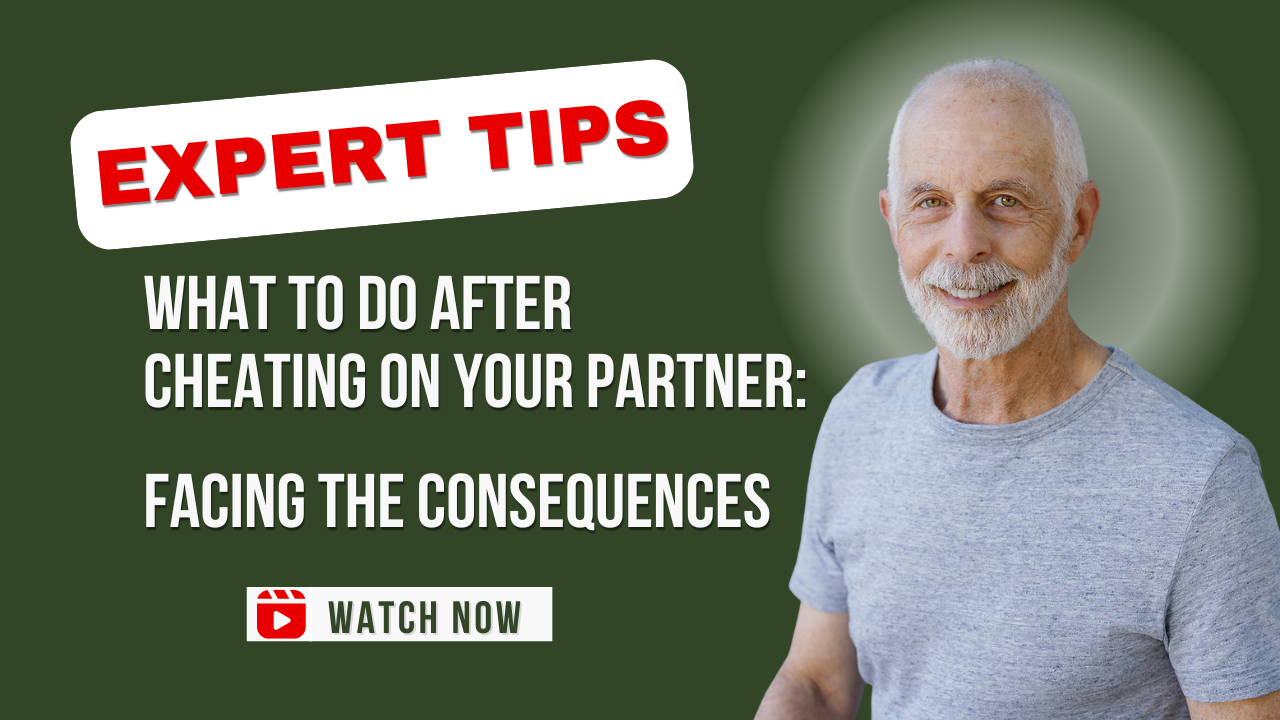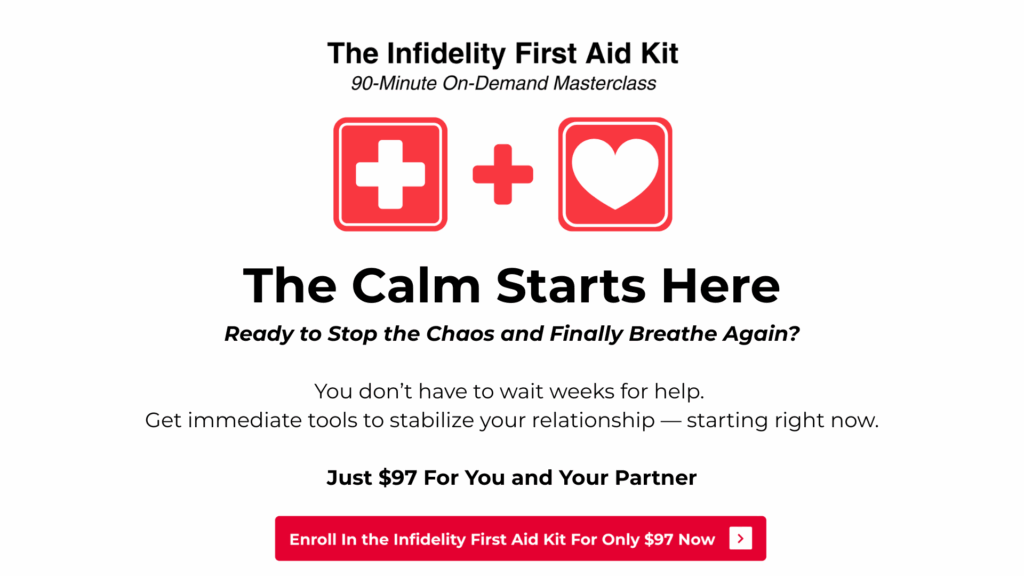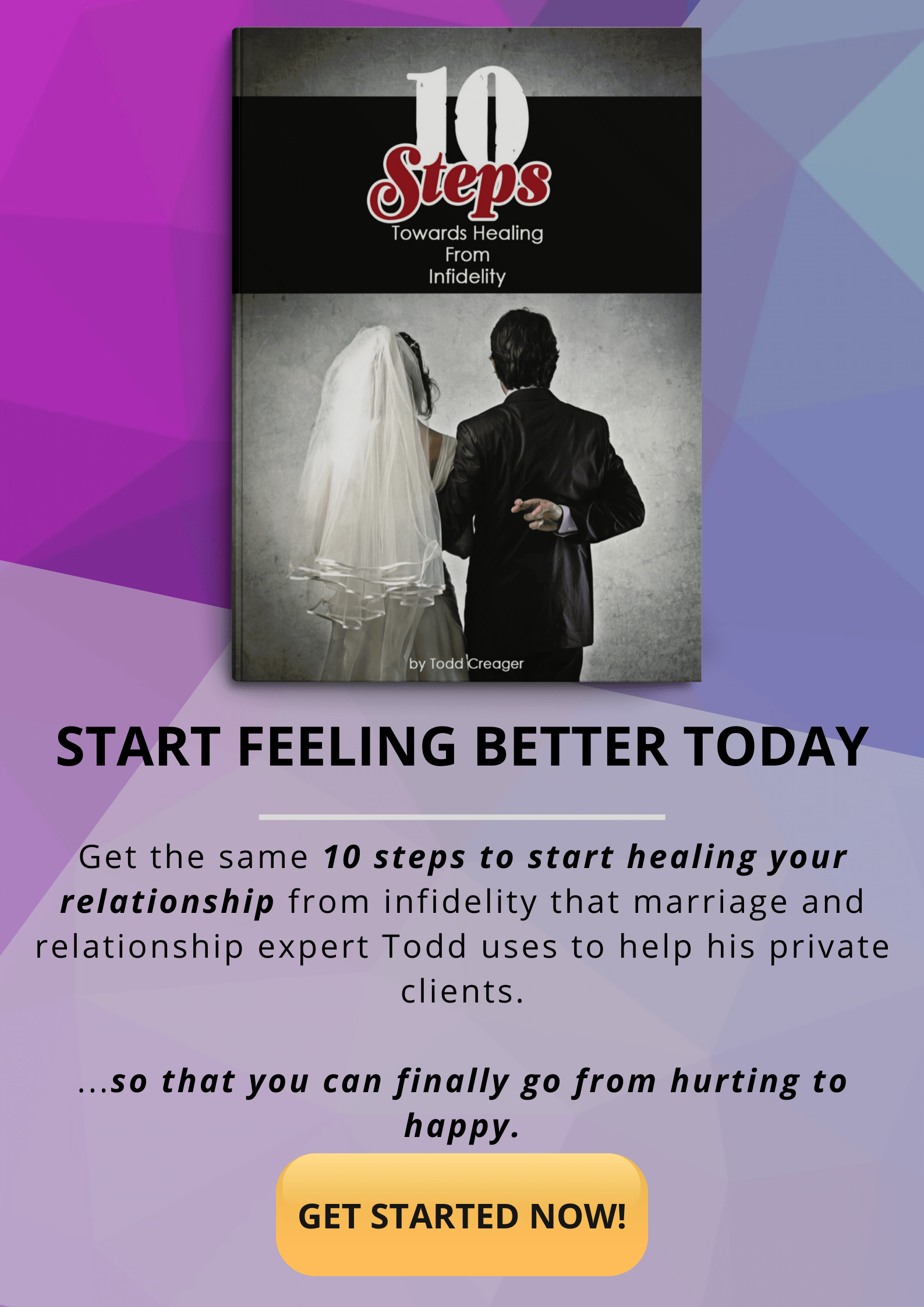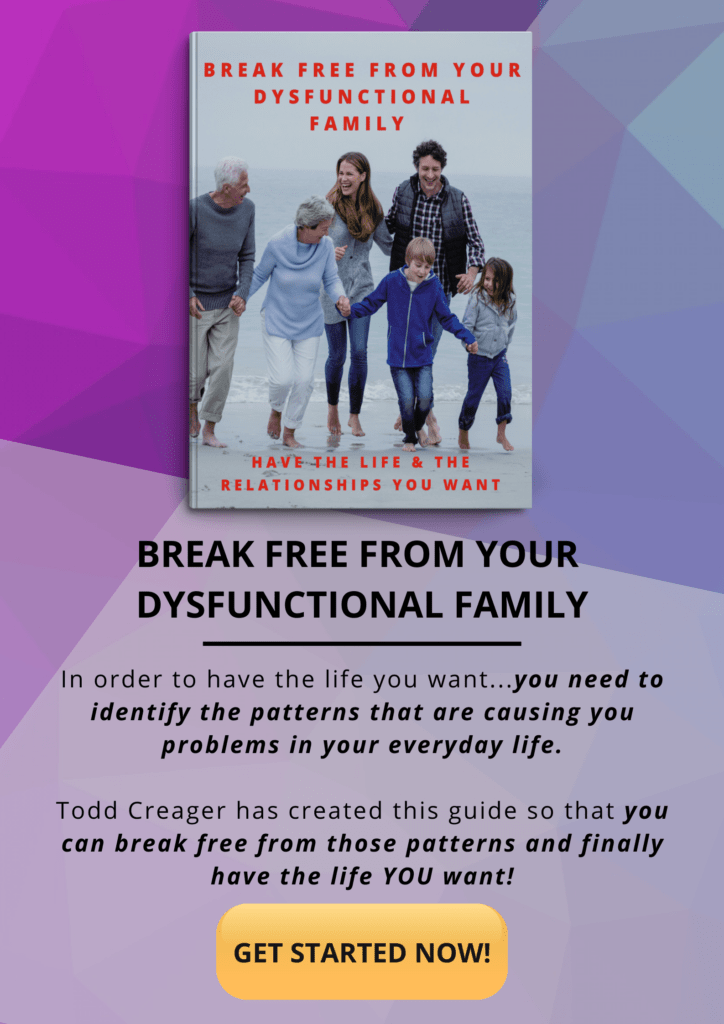Facing Consequences After Infidelity: A Guide for the Person Who Betrayed
Here’s something I see in my practice almost weekly: a person who committed infidelity comes in expecting me to give them a roadmap to “fix things fast.” They want their partner to forgive them, trust them again, and move on. But facing consequences after infidelity doesn’t work that way.
If you’ve had an affair or betrayed your partner, how you handle the fallout matters as much as the infidelity itself. Accept reality without resistance, honor your partner’s needs (even if it means separation), own your choices without defensiveness, and bear the pain instead of trying to escape it.
What most people miss:
→ Facing consequences maturely after infidelity can determine whether your relationship survives, regardless of whether you stay together
→ Your partner leaving isn’t punishment—it’s self-protection and self-respect
→ The more you accept what you did, the less defensive you’ll become
→ Making better choices now matters, even if the relationship doesn’t survive
This article addresses what happens after the affair is discovered—the consequences of infidelity from the betrayer’s perspective.
I’m talking directly to you—the person who cheated—but if you’re the betrayed partner, this will help you understand what healthy accountability looks like.
Understanding the Consequences of Infidelity: What You’re Really Facing
Let me be straight with you. Your partner might leave. They might need physical separation, whether temporary or permanent. This happens. I have three couples in my caseload right now where the betrayed partner is saying “that’s it, I’m done” after multiple infidelities.
The panic you’re feeling? That’s normal. But don’t let it take over. Don’t become self-absorbed in this moment.
Your partner is reeling. They’re in pain. They’re dealing with the aftermath of infidelity in very difficult ways. This is not the time to center yourself.
How to handle the consequences if your partner leaves:
Accept what is. There’s a loss happening. You need to handle it with the intention to be a better person. Yes, you messed up through infidelity. Secrets are terrible. But how you handle this stage—post-discovery—gives you at least another chance to make better choices.
You made poor choices that led to this moment. Now you can make better choices, even if it hurts.
Be willing to bear pain. Don’t resist it. Don’t insist everything should be good. Don’t insist your partner should just get over it.
Don’t take their leaving as punishment for you, even if it feels that way. Take it as your partner trying to have some sense of protection, some sense of self-respect. That’s important for them.
I want you to root for your partner to be as happy as possible—whether you get your way or not.
The Model Response I’m Seeing Right Now
One of the betrayers I’m working with right now—he’s feeling the devastation. He definitely doesn’t want his partner to leave. He wants her to trust him, that he’ll do it right this time. But she’s been through this multiple times before, and she’s not willing to reconcile. Maybe not ever.
He’s very upset. But he’s handling it by seeing her happiness as important. He actually said these words: “If leaving me is gonna make you happier, then I need to accept that.”
He’s not running away from his reality. He’s accepting it.
That’s handling loss maturely. You need to honor your partner’s needs to leave if they’re going to leave.
Explaining Your Infidelity to Family and Friends
Other consequences you’ll face: kids, extended family, friends. How do you explain this to them?
With children (age-appropriate approach):
Little children don’t need details. But kids are tuned in. They know something’s not good in the house.
You don’t want to deny reality. Say something like: “Yeah, we’re having some issues. Mom and I—I’m sorry if it’s upsetting you, but we’ll always be here for you. We love you. But we’re having some issues.”
For little children, that might be all you need to say.
For older kids and teenagers—it’s different. I’ve had several cases now where teenagers caught the parent in the actual infidelity, or they’re old enough to know what’s going on.
In those cases, it’s often important to face it and tell the truth. “Look, I did this. There’s a part of me that acted out.”
You have to handle this maturely too, being appropriate based on the age of your children. Be big. Accept that you might get found out—that there’s another part of you people didn’t see or know about. You might not even have been aware of it until you started acting out.
But you did it. You made that choice.
With extended family:
That’s up to you and your partner—who gets told and who doesn’t. I’ve seen many different situations. But if it seems necessary to tell family, or if your partner needed support (which sometimes they do) and they shared it—you just own it.
“Yeah, there’s a part of me that did that. I have things to look at. I hurt my spouse and I’m sorry for that. I’ve got to face it and deal with the consequences.”
With friends:
Same thing. Who you tell, how you explain it—you own it. You tell the truth.
Taking Responsibility After Infidelity: Owning It Without Defensiveness
You own it by recognizing you’re human.
A lot of people cheat. I’m not saying it’s good. But a lot of people commit infidelity. It’s part of the human phenomenon. We need to look at that. (Part of my job is understanding why there’s so much of it.)
What you did was hurtful. It was what I call an interpersonal crime. You stole from your partner the opportunity to make decisions based on what was really true. Because you had these secrets, and your partner was being with you, living with you, even loving you under false pretenses.
That’s a form of robbery, as I see it.
But it doesn’t mean you’re a bad person.
This is not a time to beat yourself up.
Facing the consequences maturely is actually assisted by you practicing acceptance. “This is a part of me. It’s something that’s not okay. I’ve got to look at why I made those choices. But I’m not gonna beat myself up. I don’t have to let shame take me over.”
The more you accept that about yourself—yes, I am capable of cheating, I am capable of causing pain, and I’ve done it—the less chance you’ll be defensive.
Why defend yourself from what’s already true?
There’s no defense. You did what you did. There were reasons for it, but there’s no excuse. We want to look at the reasons. We don’t want to demonize you. You don’t want to demonize yourself.
Be Mature.
Part of being mature is deciding not to resist the pain. Life is often painful. You inflicted pain, and you also have pain about it. Accept it. Own it without blaming the other person and without defending yourself.
Because you don’t have to. You’re not bad in your core. You’re a good person. But you did some things based on factors you might be conscious or unconscious of, and you need to pay attention, take a look, and change it.
Accepting the Outcome (Even When It’s Not What You Want)
These questions I’m addressing are coming right out of my practice over decades. Here’s what I tell people:
You either resist reality or you don’t.
When you resist reality, it doesn’t change reality. It just makes it worse.
You have to let go of resisting what is. What the outcome is. What your partner has decided to do.
Maybe your partner’s leaving. Maybe you’ve been found out by people you wished hadn’t known. Maybe there’s been collateral damage with children. I’ve had people where they infected their partner with a sexually transmitted disease.
These are all things that could happen. None of these might be what you want.
Maybe what you really wanted was to just be forgiven and move on with things the way they were, or at least stay together. Doesn’t always happen that way.
You have to accept you’re human.
You’re special—we all are special—but you’re not special in the sense that there are no consequences for your choices.
You just make a decision to accept it. You make a decision: I’m going to be mature. I’m going to bear the pain. I’m not gonna live my life in what I call “tension-reductive ways.”
What Are Tension-Reductive Ways?
A lot of people—the average person does this—live in tension-reductive ways. As soon as I feel tension, I do something to relieve it.
Maybe I blame. Maybe I project. Maybe I act out in some other ways. Maybe I don’t own it or take responsibility, because I don’t want to feel the reality of what I did.
No. That’s not what you want to do.
Don’t fight reality. Accept your consequences maturely. If you didn’t get what you want, accept that.
The Path Forward: What Growth Looks Like
Continue to look at it as: What do I need to grow on? How do I need to grow up? What do I need to develop in myself?
Do everything you can so that you have the best possible life you can have. If you end up getting another relationship (if this one didn’t make it), or if you stay together—you can be the best possible person for that person as well as for yourself.
Here’s what I want you to take from this:
It’s time to make choices now that are better, even though your previous choices were not your best. Handle it like a mature person. You can do this. Practice not inflicting more damage on yourself and others.
Decision Framework: Are You Handling the Consequences of Infidelity Maturely?
Ask yourself these questions:
When your partner expresses pain or anger, do you:
→ Listen without interrupting or defending?
→ Accept their reality without minimizing?
→ Root for their wellbeing, even if it doesn’t include you?
When facing separation or loss, do you:
→ Accept what is without fighting reality?
→ Honor their need for space or protection?
→ Bear the pain instead of trying to escape it?
When explaining to others, do you:
→ Own your choices without making excuses?
→ Tell the truth age-appropriately?
→ Accept being “found out” as part of the consequence?
In your internal dialogue, are you:
→ Accepting you’re human and capable of this without shame-spiraling?
→ Looking at the reasons without defending the actions?
→ Making decisions based on who you want to become?
If you’re answering “no” to most of these, you’re likely in tension-reductive mode. That’s where the real work needs to happen.
What This Looks Like in Practice: Real Patterns I See
Pattern 1: The Defensive Deflector This person can’t accept what happened. Every conversation turns into “but you did X” or “I only did it because Y.” They’re fighting reality at every turn. Their partner can’t heal because they’re constantly having to defend their right to be hurt.
Pattern 2: The Self-Punisher This person beats themselves up constantly. “I’m a terrible person, I’m garbage, I don’t deserve you.” Sounds like taking responsibility, right? But it’s actually another form of tension reduction. If they punish themselves enough, maybe they won’t have to feel the full weight of what they did. And ironically, it puts their partner in the position of having to comfort them.
Pattern 3: The Mature Acceptor This is rare, but when I see it, it’s powerful. This person says, “I did this. I’m not going to defend it or explain it away. I caused you pain. Whatever you need—space, separation, time—I’m going to honor that. I’m going to look at why I made these choices. And I’m going to be as good a person as I can be from this point forward, whether we stay together or not.”
Guess which one has the best chance of healing—both individually and potentially as a couple?
The Reality About Infidelity Recovery Timelines
If you’re looking for a timeline (“How long until they trust me again?”), you’re asking the wrong question. That’s still you trying to control the outcome.
Some relationships recover from infidelity in 18-24 months with intensive work. Some take five years. Some never recover, and that has to be okay too.
What I can tell you: The way you handle these first weeks and months after discovery sets the tone for everything that follows. If you handle it by resisting, defending, and trying to minimize—you’re creating more damage. If you handle it by accepting, bearing pain, and making better choices—you’re at least giving recovery a chance.
Why Professional Help Matters After Infidelity
I work with couples through infidelity recovery. What I see is that most people don’t know how to bear pain. They were never taught. They’ve spent their whole lives avoiding it, numbing it, or acting out when it shows up.
You can’t bypass pain in infidelity recovery. Both partners need to develop what I call “emotional muscles”—the ability to stay present with pain, yours and theirs.
A therapist who specializes in this can help you:
→ Understand the reasons (not excuses) for your choices
→ Develop the capacity to bear pain instead of react to it
→ Learn how to be present for your partner’s pain without defending
→ Build the emotional muscles needed for authentic intimacy
→ Navigate the complex feelings that come up during recovery
This isn’t about me selling you therapy. It’s about recognizing that most people need help learning these skills. They’re not intuitive. They’re not easy. And trying to figure this out on your own while you’re both in crisis? That’s a tough road.
Author Context: Why I Know This
I’ve been working with couples and individuals dealing with infidelity for decades. I’m a licensed marriage and family therapist, and helping people face the consequences of infidelity is the core of my practice. I’ve seen hundreds of betrayers face consequences—some handle it well, most don’t. Some relationships survive, many don’t.
What I’ve learned: How you face consequences matters more than people realize. It matters for your own wellbeing, regardless of whether the relationship survives. It matters for any future relationships you’ll have. And it definitely matters if you’re hoping this relationship can heal.
The patterns I’m sharing here come from real clinical work, not theory. When I tell you “I have three couples right now dealing with this exact thing”—I mean it. This is what I do, week after week, year after year.
The Bottom Line on Facing Consequences After Infidelity
You made choices that hurt someone you care about. You can’t undo that. But you can choose how you respond now.
Accept reality. Bear the pain. Honor your partner’s needs. Own your choices without defending them. Make better decisions from this point forward.
That’s what facing the consequences of infidelity maturely looks like.
And whether your relationship survives or not, that’s how you become a better person on the other side of this.
Making the world safe for love.
Note on methodology: This guidance is based on clinical experience with couples and individuals navigating infidelity recovery. While every situation has unique factors, these principles reflect patterns observed across hundreds of cases over decades of practice.
Individual circumstances, trauma history, addiction issues, and other factors can significantly affect how these principles apply to your specific situation.
Watch The Video Where Todd Shares What to Do After Cheating on Your Partner
Learn How to Face the Consequences
Go From Hurting to Happy Today...
When you click the button below, you’ll gain access to my exclusive Healing Infidelity From The Inside Out Guide.
It’s a powerful resource that will support you every step of the way, providing practical guidance and actionable steps toward finding peace within yourself.







Reader Interactions